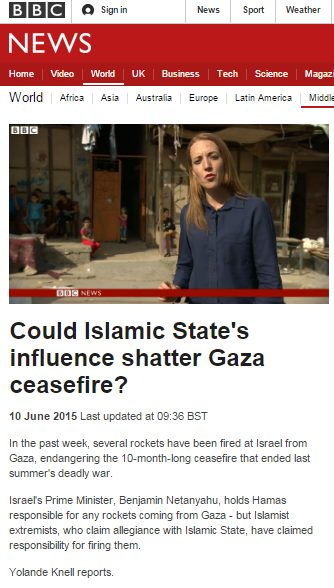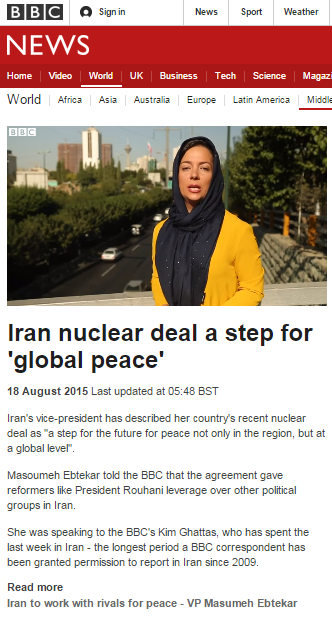On June 10th BBC audiences finally received some information on the issue of the missile fire from the Gaza Strip previously ignored by the corporation’s English language services. A filmed report produced by Yolande Knell for BBC television news also appeared on the BBC News website’s Middle East page under the title “Could Islamic State’s influence shatter Gaza ceasefire?“. The synopsis to that report reads:
“In the past week, several rockets have been fired at Israel from Gaza, endangering the 10-month-long ceasefire that ended last summer’s deadly war.
Israel’s Prime Minister, Benjamin Netanyahu, holds Hamas responsible for any rockets coming from Gaza – but Islamist extremists, who claim allegiance with Islamic State, have claimed responsibility for firing them.”
The implication in both the headline and the synopsis is that the August 26th 2014 ceasefire – which reportedly includes the clause “All Palestinian factions in Gaza will stop all attacks against Israel by land, air or sea, and will stop the construction of tunnels from Gaza into Israel” – has been upheld throughout the last ten months.
That, of course, is not the case but with BBC audiences having received decidedly scant information on Hamas’ reconstruction of tunnels and building of additional infrastructure, its frequent test-firing of missiles, its recruitment drive and no fewer than seven separate incidents of missile fire over the past ten months, they are not in a position to appreciate that the ceasefire agreement has long been ‘endangered’.
Knell’s report opens with an interesting addition to the BBC lexicon. With Hamas having been previously portrayed as “conservative”, the term “ultra-conservative” is now apparently the terminology of choice to describe other groups along the same ideological scale.
“Gaza hasn’t begun to recover from last year’s devastating war with Israel and now its residents and the Hamas authorities are facing a new threat from within: ultra-conservative Jihadists who support the Islamic State group.”
Knell continues:
“Early this year the black flags of IS were on show at this protest against French cartoons of the Prophet Muhammed. Hamas allowed it to go ahead, wanting to show its own Islamist credentials. But recently there’ve been confrontations. Extremists have been emboldened by IS gains elsewhere in the region.”
In fact, the January 19th demonstration outside the French Cultural Centre in Gaza did not confine itself to harmless-sounding “protest against French cartoons” – as Reuters reported at the time.
“Today, we are telling France and world countries that while Islam orders us to respect all religions, it also orders us to punish and kill those who assault and offend Islam’s Prophet Mohammad,” said one of the protesters, Abu Abdallah al-Makdissi.[…]
Jihadist Salafis held aloft posters of the two gunmen who carried out the Charlie Hebdo attack and a third militant who killed four people two days later at a kosher supermarket in Paris. All three attackers were killed by police on Jan. 9.
“You have to await more heroes of Islam, you worshippers of the Cross,” the crowd chanted.”
In addition, Knell’s claim that confrontations between Hamas and Salafist Jihadists in the Gaza Strip are a recent phenomenon is misleading: such confrontations have been going on sporadically since 2009 and in 2012 her own colleague Jon Donnison reported on the issue. In late 2013 and early 2014, Knell herself produced reports on the subject of Gaza Jihadists going to fight in Syria.
Later on Knell tells viewers:
“Hamas blames IS for attacks on its security forces. They’ve made dozens of arrests and last week they raided the home of a prominent activist and shot him dead. Now tensions are running high in Gaza. Militants linked to Islamic State pledged revenge for what happened here and in the past week they fired rockets at Israel.”
Knell shows no interest in finding out how Gaza Strip Salafists managed to acquire military grade weaponry, but the Guardian’s Peter Beaumont whilst reporting on the same story came up with an interesting possibility.
“According to Abu Bilel – in claims that could not be independently verified – the rockets fired recently at Israel were originally Hamas rockets diverted by those sympathetic to the Salafists. The site of one rocket launch, say those familiar with it, was one used by Hamas during last summer’s war.
“We don’t have our own rockets,” he explained, adding that members of his group had also had “military training” from former members of Hamas who had defected.”
Neither does Knell clarify to viewers that the two incidents of missile fire on June 3rd and June 6th – neither of which was reported by the BBC in English at the time – were preceded by five additional incidents of missile fire (see ‘related articles’ below) on September 16th, October 31st, December 19th, April 23rd and May 26th.
She does however tell viewers that:
“Israel holds Hamas responsible and it’s hit back with airstrikes.”
Of course with Hamas having agreed to the August 26th ceasefire deal according to which “All Palestinian factions in Gaza will stop all attacks against Israel” [emphasis added], it is obvious that it – as the authority in charge of the Gaza Strip (as Knell told her viewers right at the beginning of her report) – is responsible for the prevention of attacks both by members of its own group and others.
As has been amply evident in the past, when Hamas wants to prevent missile fire it is capable of doing so. Yolande Knell, however, closes her report with the suggestion that the future of the ceasefire agreement is beyond Hamas’ control and responsibility.
“There are fears that IS could force a fragile ceasefire deal to collapse. […] At the moment Islamic State has relatively few followers here and yet its ability to provoke and pressure local leaders could be a worrying sign for the future.”
Perhaps the most notable aspect of Knell’s report though is the absence of any information whatsoever concerning the people at the receiving end of terror attacks prompted by infighting between two different Palestinian factions. The Salafist groups which claimed responsibility for the last two episodes of missile fire of course did not aim those projectiles “at Israel” as Knell claims, but at the residents of Israeli towns and villages who, as has so often been the case in the past, do not even get a mention in the BBC’s account of events.
Related Articles:
A BBC News report tells readers: ‘ceasefire has held’ and ‘mortar fired’
The BBC News website’s Middle East priorities: missile ignored, football fight reported
Missile from Gaza not news for the BBC but Israeli response gets headlines
No BBC report on latest missile attack from Gaza Strip
Another Gaza Strip missile attack goes unreported by the BBC – in English
BBC News ignores missile attack from Gaza but BBC Arabic reports response




